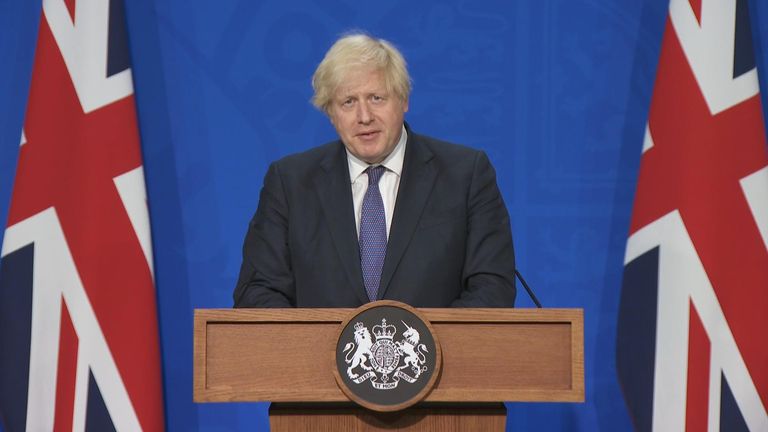COVID-19: Hospital admissions could peak at 1,000 to 2,000 a day in England during third wave, scientists believe
Between 1,000 and 2,000 COVID-19 patients a day could be admitted to hospital in England at the peak of the third wave and there may be 100 to 200 daily deaths, government scientists believe.
The number of daily infections in this latest wave is not expected to peak before mid-August, according to papers newly released by the Scientific Advisory Group for Emergencies (SAGE).
Experts are urging the public to “go slow” once most restrictions lift on 19 July, in order to curb infections and cut the number of people who will die from COVID-19.
They recommend workers do not all head back to the office from mid-July, continue to wear masks in crowded spaces, and stay at home when infected or contacted by the NHS app or NHS Test and Trace.
Live COVID updates from the UK and around the world
Scientists claim if people revert to normal pre-pandemic behaviour all at once on 19 July, then there will be a big wave of infection and larger numbers admitted to hospital.
Instead, if behaviour reverts to normal over several months, the impact will be lower.
It comes as the government announced England will move to the fourth and final stage of the roadmap for lifting most lockdown restrictions in a week’s time.
All coronavirus limits on gatherings will be removed on 19 July, masks will no longer be legally required, social distancing measures will be scrapped and the order to work from home will be lifted.
But Boris Johnson urged the nation to proceed with caution, saying the government was recommending people still wear face coverings in crowded and enclosed spaces such as public transport.
And the prime minister also said at a news conference he was not expecting the whole country to return to their desks next Monday.
He warned the pandemic “is not over”, adding the removal of restrictions “should not be taken as a sign to have a great jubilee”.
He went on: “This disease, coronavirus, continues to carry risks for you and your family. We cannot simply revert instantly from Monday July 19 to life as it was before COVID.”
England’s chief medical officer Professor Chris Whitty said: “The slower we takes it, the fewer people will have COVID, the smaller the peak will be and the smaller the number of people who go into hospital and die.”
He continued: “If we go slowly with the next stage of the roadmap, the expectation is this will not reach the point where it is putting unsustainable pressure on the NHS.”
On 19 July being chosen as the time to lift restrictions, despite opposition from some scientists, Prof Whitty said: “There is no such thing as an ideal date.”
“There is no clear evidence that a delay now is going to make a difference,” he added.
The UK has reported 34,471 new COVID-19 cases and six more coronavirus-related deaths in the latest 24-hour period.
The figures compare with 31,772 infections and 26 deaths announced yesterday, while 27,334 cases and nine fatalities were recorded this time last week.
It is the sixth day in a row where total cases have been more than 30,000.
According to the latest government data, 563 COVID patients were admitted to hospital on 6 July and a total of 3,081 people were admitted over seven days – a weekly rise of 56.6%.
Follow the Daily podcast on Apple Podcasts, Google Podcasts, Spotify, Spreaker
Source: Read Full Article



